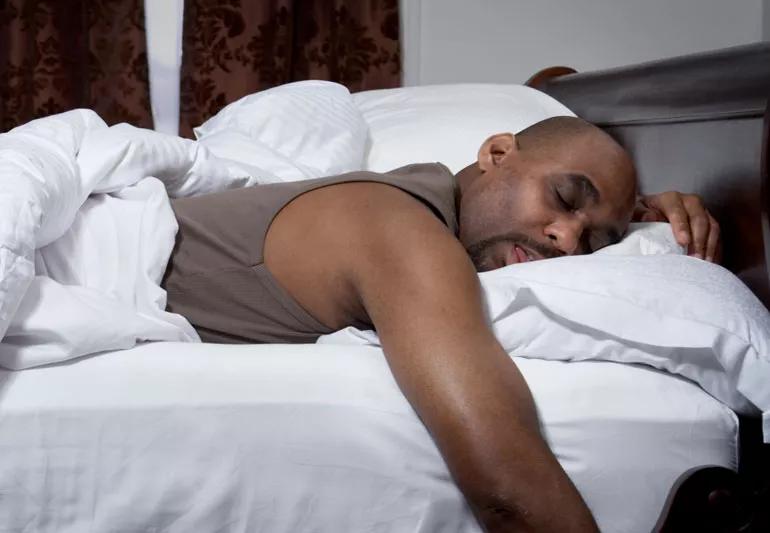Spending the night on your belly can cause pain in your back, neck and shoulders

Image content: This image is available to view online.
View image online (https://assets.clevelandclinic.org/transform/b3def0f8-00cd-4445-9040-b72c88c23d0c/sleepPositions-75164570-770x533-1_jpg)
man sleeping on his stomach
Falling face-first can lead to aches and pains — especially if that describes how you hit the sheets at night to go to sleep.
Advertisement
Cleveland Clinic is a non-profit academic medical center. Advertising on our site helps support our mission. We do not endorse non-Cleveland Clinic products or services. Policy
Sleeping face down on your stomach can put extra stress on your back, neck and shoulders. That little bit of tension can add up over seven or eight hours, leaving you feeling a little worse for wear by the time the sun rises.
So, how can lying still and doing nothing make your muscles hurt? Chiropractor Andrew Bang, DC, has your answer and some tips to help you rest a bit easier.
Let’s get right to the point: The answer to this question is usually NO, especially when it comes to treating your spine right.
Studies show that your choice of sleeping position can increase or decrease spinal pain, notes Dr. Bang. That’s a big deal, given the massive spike in neck and back pain reported in recent years.
Sleeping on your side or back is considered the best for your back and neck. (Learn more about these positions and variations.)
“You spend about one-third of your life sleeping,” says Dr. Bang. “How you position yourself during that time matters. Your goal should be to take as much pressure as possible off your joints and muscles.”
Sleeping prone on your stomach is generally not recommended. Here’s why:
Sleeping comfortably is all about body mechanics. “You have to keep your spine in alignment, just like your car,” explains Dr. Bang. “If you hit a bump with your car, you can still drive — but you feel a shudder and know it’s not good.”
Advertisement
In the same way, bad postural habits when you sleep aren’t good for your body. Sleeping on your stomach throws your alignment off by flattening and abnormally twisting your spine’s ideal curve.
“It puts added stress on your lower back — and that’s a part of the body that most of us are already taxing in our day-to-day activities,” says Dr. Bang. “Stomach sleeping doesn’t give those muscles a chance to rest and recover.”
Sleeping with your belly against your bed requires a turn of your head one way or the other to avoid suffocating in your pillow. That twist of your noggin pulls your body out of its natural alignment for a looong period of time.
Imagine locking your neck into that position for hours at a time during the day. It would eventually start to hurt, right? The same principle applies when you’re snoozing.
“Stretching your neck muscle for that long creates soreness,” says Dr. Bang.
Sleeping on your stomach also extends your neck backward, compressing your spine. This can lead to a tingling sensation as your arm “falls asleep” from constricted blood flow and compressed nerves.
What do you do with your arms if you sleep on your stomach? Most people naturally raise them up, maybe even tucking one arm (or both) under the pillow. That positioning keeps tension on your shoulder joint.
“You’re creating a situation that can eventually lead to rotator cuff problems or other shoulder issues,” states Dr. Bang.
Sleeping face down on your stomach basically mushes your facial skin, which brings consequences. Researchers found that a prone sleeping position brings wrinkle-forming compression and stress.
While stomach sleeping can lead to aches and pains for adults, it can be deadly for infants.
“Safe Sleep” recommendations by the American Academy of Pediatrics emphasize that babies should always be placed on their backs to sleep. Sleeping on their belly carries an elevated risk of sudden infant death syndrome (SIDS).
If you’re a regular stomach sleeper and want to change your overnight position, it can be done, says Dr. Bang. His advice to help with the transition? Use pillows.
A few well-placed pillows can basically serve as bumpers that keep you from turning onto your stomach during the night. Over time, you can train your body to remain in the side or back position.
“It takes a little practice,” he says, “but if you’re sleeping on your stomach and make the change, odds are you’re going to wake up in the morning feeling better.”
Advertisement

Sign up for our Health Essentials emails for expert guidance on nutrition, fitness, sleep, skin care and more.
Learn more about our editorial process.
Advertisement
Sleep masks can help you create total darkness so you can sleep better
To avoid sleep deprivation and shift work sleep disorder, try adopting habits that minimize light exposure and prioritize daytime sleep
Sleep disorders, mental health conditions and other health concerns can all affect the quality of your sleep
Most people fall asleep within 10 to 20 minutes, but if your experience is different, adjusting your sleep schedule may help
Stick to a consistent schedule, be mindful of screen time and work on reducing your stress levels before bed
Napping can boost focus, memory and mood — if you time it right
These devices can help shed light on what’s happening with your body during rest
Keep a dream journal, set your intentions before bed and make sure you’re getting a full night of high-quality sleep
Although it could be used as a moisturizer, this new trend is not recommended
Communicating clear limits helps protect your time, energy and emotional well-being
High cholesterol can be genetic, but testing and treatment can lower your heart disease risk